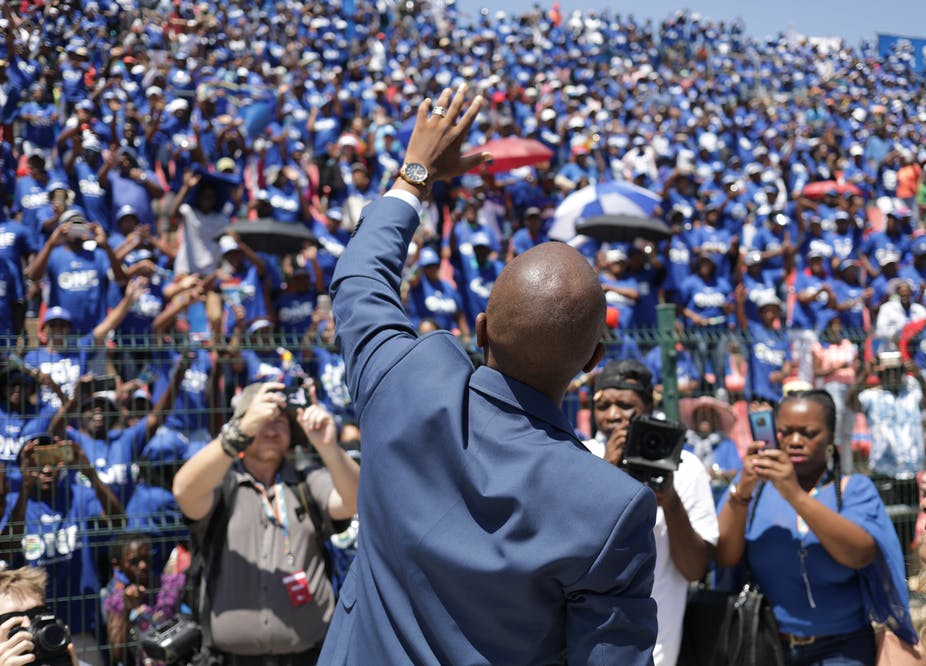DA’s ‘policy double-speak, ANC obsession’ sank it in elections
The party had tried to satisfy both the black and white constituencies, analysts said, and under weak top leadership this backfired.

Mmusi Maimane, leader of South Africa’s main opposition party, the Democratic Alliance, on the campaign trail, April 2019. Picture: EFE-EPA / Kim Ludbrook
The Democratic Alliance (DA) is a victim of its own making due to its policy double-speak, poorly managed top echelon and obsession with the ruling ANC, all of which caused its decline, political experts say.
They said that in the process of trying to be everything to everybody, the DA lost out.
Political analyst Somadoda Fikeni highlighted several factors that contributed to the official opposition’s poor performance in the 2019 elections.
The DA dropped from 22.2% in the 2014 election to 20,7% in 2019.
He said policy ambiguity was to blame for the DA’s declining support as well as the fact that the party had reached the peak of support from whites.
He also cited the revolving door syndrome of conservative groups leaving the DA for parties like the Freedom Front Plus (FF+) as new recruits, especially blacks, joined.
Maimane’s poor leadership was also a factor for the poor showing, Fikeni claimed.
He lambasted the party for its obsession with the ANC and said it should focus on its alternatives.
Professor of politics at Unisa Dirk Kotze echoed Fikeni.
He said the DA’s ambivalence on policies, such as black economic empowerment and affirmative action, did not do it any good. The party had tried to satisfy both the black and white constituencies, but had failed to handle the balance of forces properly.
Blacks wanted reform, but conservative whites opposed liberal policies, which put the DA in a dilemma.
“Blacks felt the DA did not go far enough on BEE and affirmative action and was ambiguous on land expropriation. White conservative voters felt the DA had sold out with its liberal policies,” he said.
Both constituencies abandoned the party at the polls in favour of the ANC and the FF+.
Analysing the performance of the top parties, Kotze said the elections showed a differential between national and provincial votes for all parties. The ANC performed better on national than provincial votes whereas the DA had a poor showing nationally, but a good showing at provincial level, especially in the Western Cape.
Similarly, the Economic Freedom Fighters (EFF) failed to perform as expected in provinces like Gauteng, but it gained support at national level. Since its inception, the EFF has been taking votes from the ANC, he added.
This view is supported by an Institute of Race Relations survey. The FF+ did better both at national and provincial level, except in KwaZulu-Natal and the Free State. The party increased its parliamentary representation from four to 10 MPs and was represented in eight of the nine provinces.
“The provincial vote represents the core constituency of a party. … It’s important that a political party does well among its constituency, which should increase its national performance.”
But this was not the case in this election.
“DA supporters might have voted for the party at provincial level and for someone else at national level,” Kotze said. “They took their votes to the ANC perhaps because of the Ramaphosa factor. The FF+ support is artificial, caused by DA supporters upset with the way the party was managed at the top.”
Kotze claimed the resignation of DA policy head Gwen Ngwenya, who became disillusioned with the DA’s unsteady stance on pro-black policies, was a sign of policy uncertainty in the party.
– ericn@citizen.co.za
For more news your way, download The Citizen’s app for iOS and Android.







